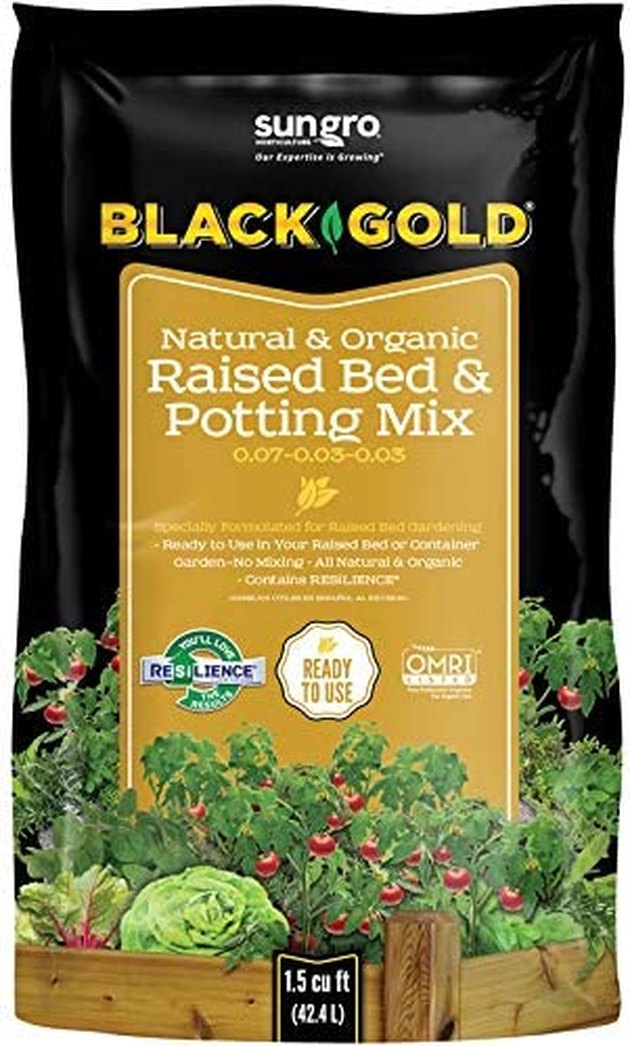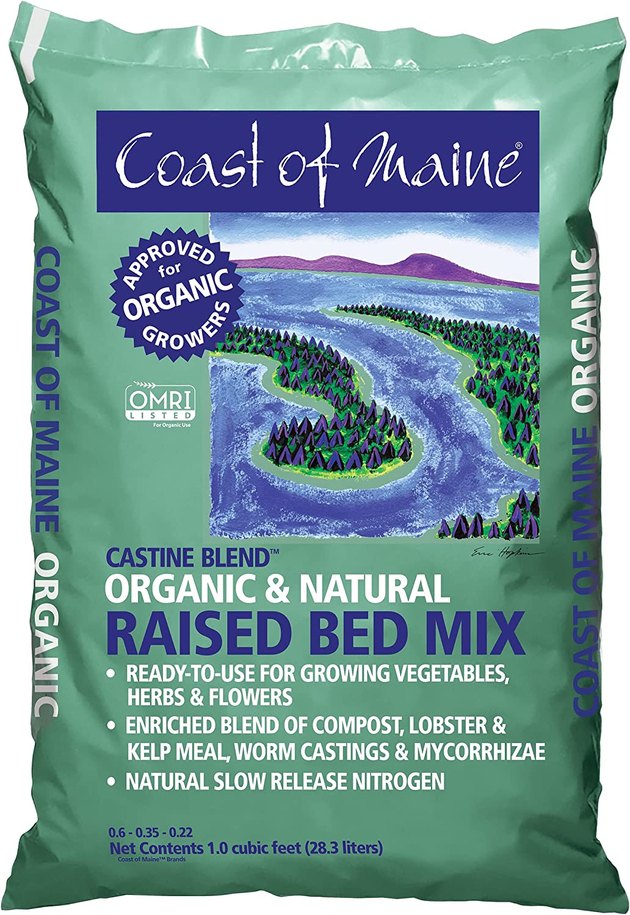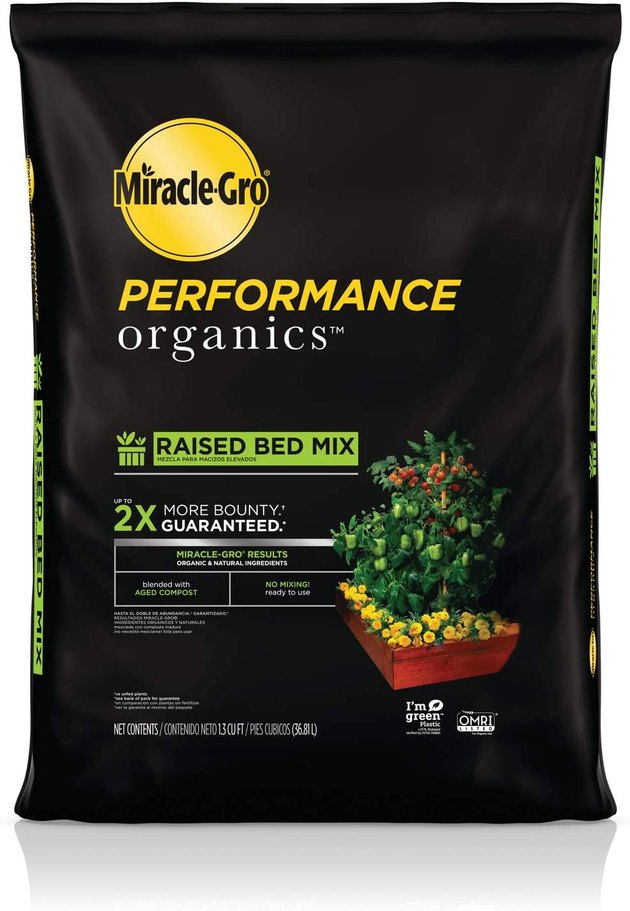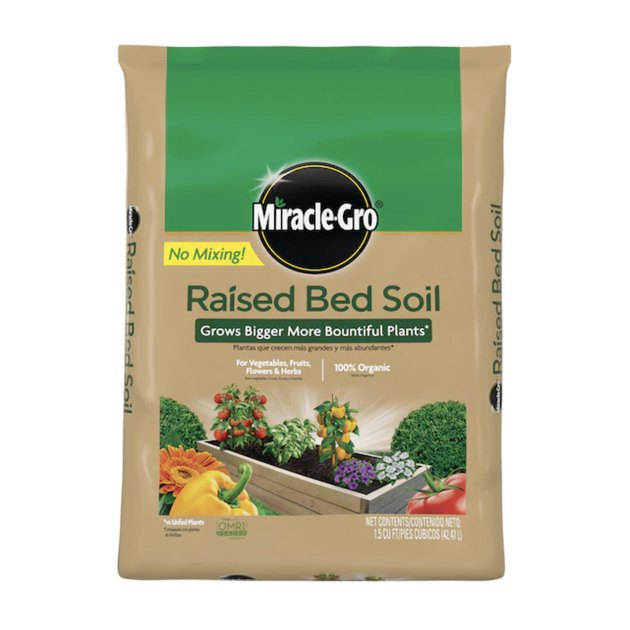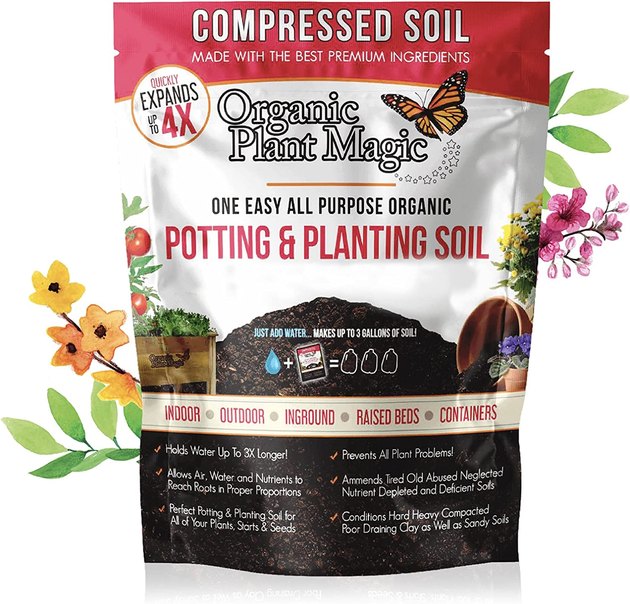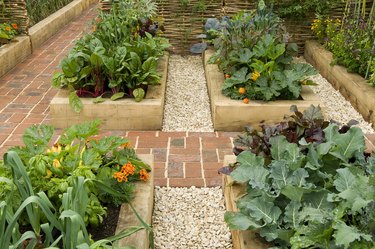
Gardening with raised beds is the perfect solution for those who have little gardening space, limited mobility, or native soil that's compacted and lacking in nutrients, making it less than ideal. Besides moisture and sunshine, soil is a major component of successful gardening and with a raised bed you get total control of the soils you use. Fortunately, you have a wealth of choices when it comes to bagged soil that is blended specifically for gardening in raised beds.
However, all bagged soils are not created equal. Garden soil is generally too heavy, leading to drainage problems, and straight potting mixes are too lightweight, drying out quickly. Bagged soil for raised beds offers the perfect blend of garden soil and potting mix, along with necessary nutrients, to ensure optimal drainage and a healthy environment for your plants' growth. Raised bed soil has just the right amount of looseness, giving your plants' root systems a sufficient amount of oxygen and nutrients, leading to robust and healthy growth.
Video of the Day
Video of the Day
Additionally, bagged soil for raised beds has a balanced pH of 5.8 to 7.5, making it the perfect blend for growing flowering ornamentals along with fruits and vegetables. The additives in the soil promote better moisture retention and soil aeration as well as influence fertility. Bagged soil for raised beds can contain additives like worm castings, poultry meal, mushroom compost, well-rotted manure, sphagnum peat moss, coconut coir and forest products.
What to Consider When Purchasing Raised Bed Soil
Organic Versus Inorganic: The main difference between organic and inorganic bagged raised bed soils is organic soils contain living ingredients and non-organic soils also contain inorganic ingredients like synthetic fertilizers. Organic soils contain ingredients like compost and organic fertilizers like worm castings. Organic soils state so on the outside of the package and contain the Organic Materials Review Institute's (OMRI) mark on qualifying products for use in the garden and maintaining an organic status for growing.
On the other hand, inorganic soil mixes don't necessarily mean they contain synthetic pesticides or fertilizers. Rather, they may contain non-living ingredients such as pebbles, perlite or rock phosphate. These mixes can also include synthetic fertilizers to feed plants and but they don't contain organic fertilizers like kelp, poultry meal, or worm castings. Both products work well in growing your plants, although if you prefer growing in a natural soil mixture you'll want to go organic.
Soil Nutrients and Ingredients: Knowing what ingredients and nutrients are contained in the bagged soil can make the difference between plants producing healthy and robust growth and those that don't. Depending on the particular raised bed soil, nutrients can include everything from synthetic fertilizers in inorganic blends to organic nutrients like fish meal, worm castings, kelp meal, well-rotted manure or compost.
Ingredients in a quality soil blend will positively affect soil aeration, moisture retention and the soil's texture. Although you may feel you're saving money by going with an ultra-cheap bag of soil, many times these soils contain a wealth of weed seeds, debris and contaminants. These very cheap soils are low-quality and more than likely don't contain the valuable nutrients plants require for good growth. You'll end up spending more money, in the long run, beefing up your soil's quality and nutrients the original soil lacked to promote healthy plants.
Amount of Soil Required: When purchasing soil for your raised bed, it's important to know how much you'll need to fill the bed. The last thing you want is to start filling the bed and realize you need more bags. Different brands of bagged raised bed soil contain different amounts, so it's better to end up with an extra bag or two you can utilize in containers than run short. Depending on what you're growing, you should have around 6 inches of soil when growing standard crops. However, if you're growing root vegetables like carrots, 12 inches of soil is needed for proper root growth.
Although all bags of raised bed soil are ready-to-use, some brands have expansion properties. Before planting, you fill the bed with the soil, add water and stir, and the soil expands to twice its mass or more. Additionally, many bagged soils tell you how much you'll need to fill a certain area of space.
Price: Before settling on a particular soil, make sure you do some comparison shopping so you end up getting the best soil for the best value. Compare the various soil ingredients, how much soil is contained in each bag and the price. This assures you get the best quality soil for the best price. Once again, going with the cheapest bag doesn't necessarily mean you're getting top-quality soil for the best price. If you have to add additional ingredients to pump up the soil's quality and fertility, all your supposed savings go right out the door.
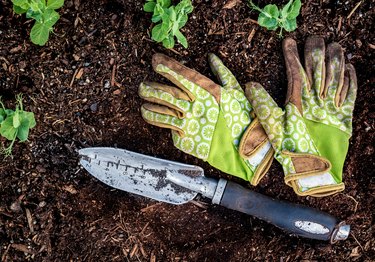
The Best Overall Bagged Soil for Raised Beds
Black Gold potting mix is 100% organic, carrying the OMRI seal. The ready-to-use soil is the perfect combination of ingredients for growing herbs, vegetables, annuals and perennials, as well as suitable for use in raised beds, containers or as a soil amendment. Each bag contains 1.5 cubic feet of soil and weighs 23 pounds.
This rich fertile mix's primary ingredients that lead to good drainage and moisture retention include Canadian sphagnum peat moss, processed bark and forest products, coconut coir, perlite, vermiculite, and organic wetting agent and water-holding crystals. Additional ingredients leading to good growth and fertility include worm castings, manure, compost, dolomite lime, shrimp and seafood meal compost, controlled-release fertilizer, starter charge, and Resilience® (AKA silicon that promotes stronger growth).
The soil has a light and airy texture due to the composted forest products and peat moss, allowing air to circulate around the roots and promoting good drainage. The water-holding crystals allow for moisture retention, meaning the soil won't quickly become completely dry, and best of all, with all the natural fertility ingredients, Black Gold offers plants complete nutrition contained in a single bag.
The Best Organic Bagged Soil For Raised Beds
Coast of Maine's organic raised bed mix carries the OMRI seal with all the ingredients meeting organic standards. This rich, dark, compost-based soil has a great texture that promotes good drainage, meaning oxygen circulates around the plant's root system, leading to healthier plants. The mix comes in ready-to-use, 1-cubic-foot bags and can be used in raised beds, containers or directly in the garden. No matter what you're growing, this fertile soil promotes healthy growth with a pH of 6.5.
The hand-crafted mix is sourced locally from farms and the ocean, resulting in a rich, fertile soil blend packed full of organic ingredients. Aged compost is made up of cow manure, worm castings, biochar, dehydrated poultry manure, greensand, peat, lobster and kelp meal, mycorrhizae and lime. The composted mixture results in well-balanced soil with a good texture that promotes proper drainage and moisture retention, as well as good fertility for growing hardy plants.
The Best Value Bagged Soil for Raised Beds
Miracle-Gro performance organics raised bed mix is 100% organic, carrying the OMRI seal, and comes in 1.3 cubic-foot bags. It's a good soil choice to grow all your vegetables, herbs and ornamentals, and the company claims you can expect two times the bounty of your veggies when its mix is used. The ready-to-use soil is specially formulated for use in raised beds and is made up of a blend of aged compost promoting fertility, good drainage and healthy growth.
The soil's composted ingredients leading to a good texture and drainage include compost, rice hulls, peat, processed forest products, sphagnum peat moss, yucca and coir. Natural ingredients that improve the soil's fertility include bone meal, feather meal, soybean meal and sulfate of potash. When all of these ingredients are mixed together, you end up with organic soil promoting healthy growth and your plants fertilized with all-natural ingredients with no synthetic products. You only need to open the bag, fill your raised bed and plant!
The Best Multiple-Use Bagged Soil for Raised Beds
Miracle-Gro raised bed soil is completely organic, carrying the OMRI seal, and is available in 1.5 cubic-foot bags. The ready-to-use soil is a good choice for growing your vegetables, fruits, herbs and flowers in raised beds. With no mixing necessary, you just need to fill your bed with the mixture and plant. Ingredients such as coir, sphagnum peat moss, compost and processed forest products lead to the mix's lighter texture and promote good drainage, which results in good air circulation around the plant's roots.
The soil is also packed with natural ingredients for fertility necessary for the plant's robust growth. Ingredients such as worm castings, poultry litter, kelp meal, bone meal and alfalfa meal add to the soil's natural nutrients, giving plants a slow-release form of nitrogen that promotes healthy growth. Along with the soil's good draining qualities, it also has good water retention qualities, meaning it won't go bone dry soon after you water.
The Best Moisture Retentive Bagged Soil for Raised Beds
This organic soil mixture made up of compressed soil granules expands up to four times its mass when it's mixed with water and comes in 2-pound bags that expand to make 3 gallons of soil. It's a suitable mix used in indoor or outdoor containers, raised beds, or incorporated into native soil for inground gardens. Due to the compressed nature, the bags are easy to handle and aren't heavy.
The organic ingredients include coconut coir, worm castings, alfalfa meal, fish meal, feather meal, kelp, crab meal, soybean protein, bone meal and potassium magnesium sulfate. Slow-release nitrogen comes primarily from soy protein hydrolysate. Mixed together, these ingredients form a nicely textured soil that promotes good drainage and circulation around the plant's roots, as well as having superior moisture retention qualities (meaning you won't have to water as frequently). Just open the bag, fill your bed, add water and stir, and before you know it, the soil granules expand!
